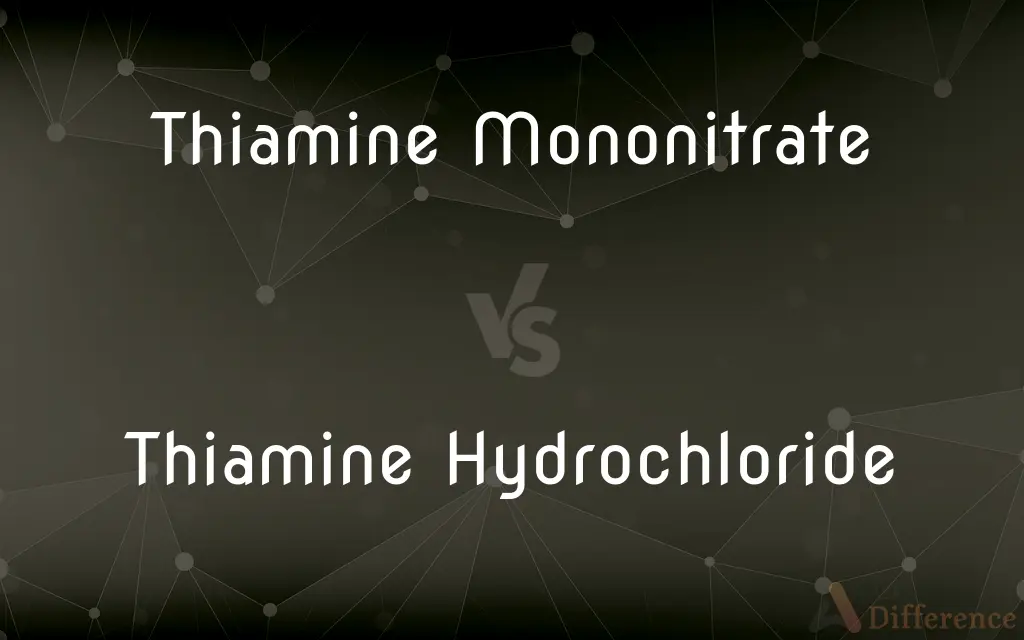Thiamine Mononitrate vs. Thiamine Hydrochloride — What's the Difference?
By Tayyaba Rehman — Published on December 25, 2023
Thiamine Mononitrate and Thiamine Hydrochloride are both stable, water-soluble forms of vitamin B1, but they differ in their chemical structures and uses.

Difference Between Thiamine Mononitrate and Thiamine Hydrochloride
Table of Contents
ADVERTISEMENT
Key Differences
Thiamine Mononitrate is one of the stable, water-soluble forms of vitamin B1. It is commonly used as a food additive due to its stability, ensuring that foods retain their vitamin B1 content during processing. On the contrary, Thiamine Hydrochloride is another form of vitamin B1, which is also water-soluble but often preferred for medical applications.
Both Thiamine Mononitrate and Thiamine Hydrochloride serve as sources of vitamin B1 when added to foods or supplements. While Thiamine Mononitrate is typically utilized in dry food products because of its non-hygroscopic nature, Thiamine Hydrochloride is more frequently found in liquid formulations.
Chemically speaking, Thiamine Mononitrate contains a nitrate group, whereas Thiamine Hydrochloride has a hydrochloride group. This distinction is crucial as it influences their respective solubilities, stabilities, and applications. Both forms, however, when ingested, release thiamine, essential for various cellular processes.
While both Thiamine Mononitrate and Thiamine Hydrochloride provide the vital nutrient thiamine, their specific applications differ based on their stability and solubility profiles. Consumers and healthcare professionals often choose between them based on the intended use and formulation requirements.
Comparison Chart
Chemical Group
Contains a nitrate group.
Contains a hydrochloride group.
ADVERTISEMENT
Typical Use
Commonly used in dry food products.
Frequently found in liquid formulations and medical applications.
Stability
Preferred for food processing due to stability.
Slightly less stable but suitable for many formulations.
Solubility
Highly water-soluble.
Highly water-soluble.
Common Application
Food fortification to ensure vitamin B1 retention during processing.
Often used in vitamin B1 supplements and injections for medical purposes.
Compare with Definitions
Thiamine Mononitrate
It's a water-soluble vitamin form.
Thiamine Mononitrate dissolves easily in water, aiding absorption in the body.
Thiamine Hydrochloride
Thiamine Hydrochloride is crucial for metabolic processes.
The body uses Thiamine Hydrochloride to convert food into energy.
Thiamine Mononitrate
Thiamine Mononitrate ensures vitamin retention in processed foods.
Manufacturers prefer Thiamine Mononitrate to preserve vitamin content during food processing.
Thiamine Hydrochloride
Thiamine Hydrochloride aids in nerve function and energy production.
Athletes might take Thiamine Hydrochloride supplements for enhanced energy production.
Thiamine Mononitrate
It is the nitrate salt form of thiamine.
Thiamine Mononitrate is chosen for its stability in dry food formulations.
Thiamine Hydrochloride
It's the hydrochloride salt variant of thiamine.
Liquid supplements often contain Thiamine Hydrochloride for efficient absorption.
Thiamine Mononitrate
Thiamine Mononitrate aids in preventing vitamin B1 deficiency.
Consuming products fortified with Thiamine Mononitrate can boost overall thiamine levels.
Thiamine Hydrochloride
Thiamine Hydrochloride is a water-soluble form of vitamin B1.
Patients deficient in vitamin B1 might receive Thiamine Hydrochloride injections.
Thiamine Mononitrate
Thiamine Mononitrate is a stable form of vitamin B1 used in food fortification.
The cereal is enriched with Thiamine Mononitrate to ensure sufficient vitamin B1 intake.
Thiamine Hydrochloride
Commonly found in medical applications.
Hospitals stock Thiamine Hydrochloride for treating specific deficiencies.
Common Curiosities
Why choose Thiamine Mononitrate over Thiamine Hydrochloride in food products?
Thiamine Mononitrate is often chosen for its stability, especially in dry food products.
Is Thiamine Hydrochloride the same as vitamin B1?
Thiamine Hydrochloride is a form of vitamin B1, suitable for supplements and medical applications.
Can Thiamine Hydrochloride be used in injections?
Yes, Thiamine Hydrochloride is often used in vitamin B1 injections for medical purposes.
Which form, Thiamine Mononitrate or Thiamine Hydrochloride, is more stable?
Thiamine Mononitrate is typically more stable, especially in dry food formulations.
Are both Thiamine Mononitrate and Thiamine Hydrochloride water-soluble?
Yes, both are water-soluble forms of vitamin B1.
What are the health benefits of both Thiamine Mononitrate and Thiamine Hydrochloride?
Both provide vitamin B1, essential for energy production, nerve function, and metabolism.
Why is Thiamine Hydrochloride common in liquid formulations?
Thiamine Hydrochloride's solubility and stability profiles make it suitable for liquid formulations.
How do Thiamine Mononitrate and Thiamine Hydrochloride differ chemically?
Thiamine Mononitrate contains a nitrate group, while Thiamine Hydrochloride contains a hydrochloride group.
Are Thiamine Mononitrate and Thiamine Hydrochloride natural?
While thiamine is naturally occurring, these specific forms are synthesized for stability and purity in products.
What is Thiamine Mononitrate used for?
Thiamine Mononitrate is commonly used for food fortification to ensure vitamin B1 retention during processing.
Can I find both Thiamine Mononitrate and Thiamine Hydrochloride in daily supplements?
Yes, both forms are found in various dietary supplements to provide vitamin B1.
Is there a difference in absorption between Thiamine Mononitrate and Thiamine Hydrochloride?
Both are efficiently absorbed, but the specific formulation or application might influence absorption rates.
How are Thiamine Mononitrate and Thiamine Hydrochloride produced?
Both are synthesized through chemical processes to ensure purity and stability.
Are there any side effects associated with Thiamine Mononitrate or Thiamine Hydrochloride?
Side effects are rare but can include allergic reactions. It's crucial to adhere to recommended dosages.
How can I ensure I'm getting enough vitamin B1 from Thiamine Mononitrate or Thiamine Hydrochloride?
Consuming a balanced diet, fortified foods, and supplements when necessary can ensure adequate vitamin B1 intake.
Share Your Discovery

Previous Comparison
Re-Order Level vs. Re-Order Quantity
Next Comparison
Boeing 767 vs. Boeing 777Author Spotlight
Written by
Tayyaba RehmanTayyaba Rehman is a distinguished writer, currently serving as a primary contributor to askdifference.com. As a researcher in semantics and etymology, Tayyaba's passion for the complexity of languages and their distinctions has found a perfect home on the platform. Tayyaba delves into the intricacies of language, distinguishing between commonly confused words and phrases, thereby providing clarity for readers worldwide.











































